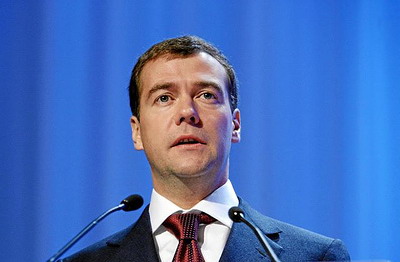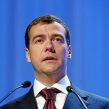
MEDVEDEV PRESENTS A GRAND DESIGN FOR FOREIGN POLICY
Publication: Eurasia Daily Monitor Volume: 5 Issue: 136
By:

There were hardly any leaks about the preparation of a new Foreign Policy Concept in the Kremlin and certainly no debates on the drafts, so President Dmitry Medvedev achieved a complete surprise unveiling this key document at the special meeting with Russian ambassadors this week (Rossiiskaya gazeta, July 16). This is in itself a testimony to the fact that despite all the new pledges to increase openness and transparency, Putin’s tradition of extreme closeness of decision-making lives on after the change to the new system of power that is often called “tandemocracy” (Kommersant-Vlast, March 10; www.gazeta.ru, July 7). It is not even clear where the work on the new concept was conducted, as the Foreign Ministry website posted the old document from 2000 the document was officially released, and the Security Council website has not seen an update since the appointment of Nikolai Patrushev as the new secretary in mid-May.
There is no apparent need to maintain all this secrecy, as the 7,000-word text (an English version is still not available) contains mostly uncontroversial generalities and platitudes. Medvedev’s address to the ambassadors was also impeccably diplomatic and did not have a single Putin-style, anti-Western barb (Kommersant, July 16). For that matter, the concept plainly reiterates Russia’s negative attitude to NATO’s expansion toward Ukraine and Georgia, but Medvedev did not find it opportune to mention this issue at all, suggesting instead that “not all is well” with the European security architecture. Elaborating on that feeble thesis, Medvedev asserted that he did not want to believe that only a total collapse of the CFE Treaty would convince everybody of the inviability of this unfair arms control regime.
The logic of such propositions might seem not exactly straight to those experts who try to figure out which principles and parameters of limiting conventional forces are acceptable to Moscow, but even more surprised would be those who focus on the pivotal role of energy-related matters in Russia’s foreign policy. Medvedev uttered one comment about the “fuel-energy sphere” in the context of relations with the EU, and the concept has just a couple of minor points on Russia’s reputation as a reliable partner on energy markets and on the need to guarantee the security of demand and transit. Apparently, the ambitious propositions about building an “energy super-power” have been abandoned and replaced by the new discourse emphasizing “innovations” and social responsibility.
Another remarkable feature is the complete omission of any references to Russia’s military might as an instrument of its foreign policy, even when discussing challenges to security and conflict management. On the contrary, much emphasis is placed on reducing the role of the “power factor” in international relations, and Medvedev noted with disapproval that the tilt toward “forceful methods” inherited from the Cold War era was increasing in several areas. He did not make the slightest hint about Russia’s own methods of manipulating the pressure on Georgia, preferring to keep silent about this conflict (www.gazeta.ru, July 14). The problem that was predictably singled out in the security context was the planned deployment in Eastern Europe of elements of a U.S. strategic defense system, and Medvedev confirmed that “partners” had been warned that Russia would “adequately respond” to this challenge (RIA-Novosti, July 15). This warning was accentuated by the removal of the pledge to continue reducing the strategic arsenal from the concept, which marks a significant difference from the previous document.
The concept points out the “inertia of the political-psychological course on ‘deterring’ Russia,” and Medvedev mentioned with an air of condescension that the Western partners were still undergoing the process of “psychological adaptation to the radically changed situation in our country.” He was not economical with his self-praise of Russia’s new strength and expanded influence, but one peculiar change in the language of the concept is the disappearance of Russia’s traditional characteristic as a “great power” (www.gazeta.ru, July 15). This slight self-depreciation is accompanied not only by multiple references to the new complexity of polycentric international relations but also by a significant devaluation of the role of the United States, which includes proposals for transforming the global financial system, since the U.S. dollar can no longer serve as a universal currency and assumptions that trans-Atlantic relations have exhausted their potential. Europe, on the contrary, has visibly gained in the priorities of Russian policy, and Medvedev reiterated his Berlin initiative on a new European security treaty that would enshrine the commitment to the non-use of force. His trademark musing on the primacy of international law boiled down to a stark statement that for the European Union, Kosovo was nearly the same as Iraq was for the United States (Kommersant, July 16).
A theme that has received an entirely disproportional amount of attention in Medvedev’s address, as well as in his several earlier speeches, and is also reflected in the concept is the revision of history, most specifically the nature and the outcome of the Second World War (Vremya novostei, July 16). It is not clear what particular issues here have aroused such indignation from the Russian President or who are the politicians responsible for the sin of “playing with fire.” It is too clear, however, that Russia still cannot sort out its own history and make a judgment on the heritage of Stalinism. Medvedev’s smooth words on democracy and human rights remain in conflict not only with such features of the present-day system of power as structural corruption and bureaucratic omnipotence, but also with the strong political tradition of authoritarianism that Putin has cultivated and continues to ride upon. For that matter, the new concept ascribes a stronger role to the government in implementing foreign policy, so Putin is not going to let his chosen successor to play solo on this stage (Ezhednevny zhurnal, July 16). The highly uncertain pattern of power-sharing in the duumvirate will inevitably cause more serious zigzags in Russia’s foreign policy than the veto in the UN Security Council on the Zimbabwe resolution.




